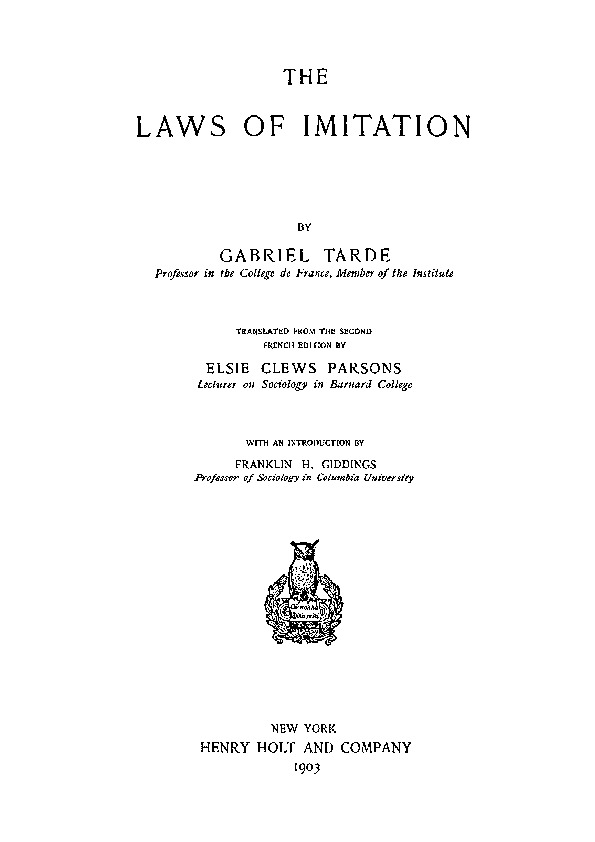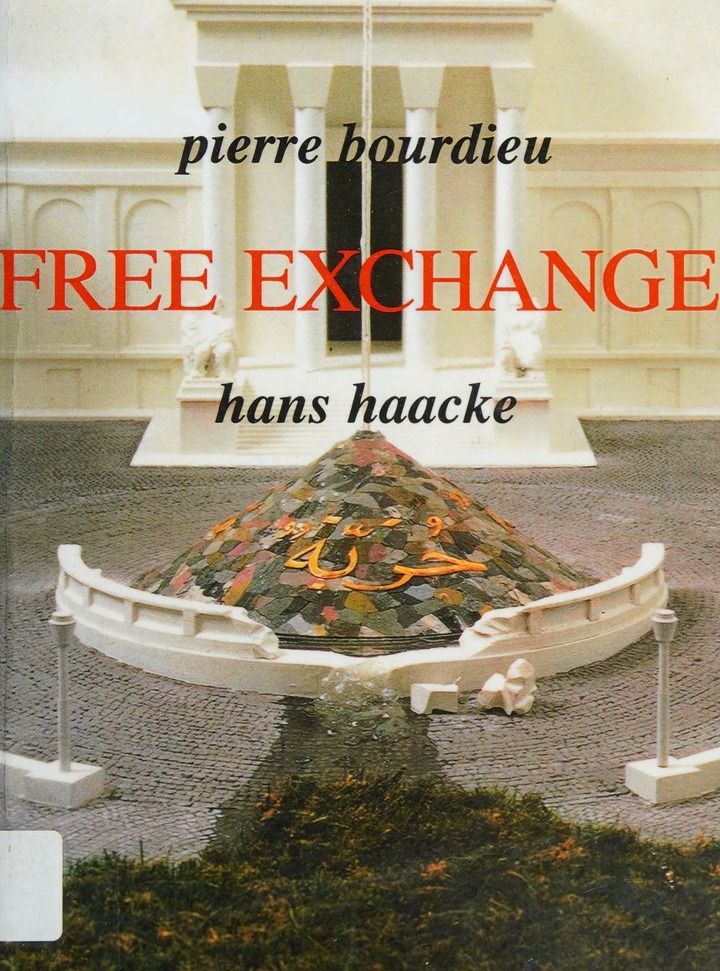Gabriel Tarde: The Laws of Imitation (1890/1903) [French/English]
Filed under book | Tags: · archaeology, criminology, imitation, invention, philosophy, psychology, society, sociology, somnabulism

“Among the phenomena that early arrested his attention was imitation. From his office of magistrate he observed the large part that imitation plays in criminal conduct. Does it play a smaller part in normal conduct? Very rapidly M. Tarde’s ardent mind ranged over the field of history, followed the spread of Western civilisation, and reviewed the development of language, the evolution of art, of law, and of institutions. The evidence was overwhelming that in all the affairs of men, whether of good or of evil report, imitation is an ever-present factor; and to a philosophical mind the implication was obvious, that there must be psychological or sociological laws of imitation, worthy of most thorough study. [..] Tarde perceived that imitation, as a social form, is only one mode of a universal activity, of that endless repetition, throughout nature, which in the physical realm we know as the undulations of ether, the vibrations of material bodies, the swing of the planets in their orbits, the alternations of light and darkness, and of seasons, the succession of life and death. Here, then, was not only a fundamental truth of social science, but also a first principle of cosmic philosophy.” (from the Introduction)
Les lois de l’imitation: étude sociologique
Publisher Félix Alcan, Paris, 1890
432 pages
English edition
Translated from the second French edition by Elsie Clews Parsons
With an Introduction by Franklin H. Giddings
Publisher Henry Holt and Company, New York, September 1903
404 pages
announcement (The New York Times, 1903)
google books [French]
google books [English]
PDF [French]
PDF [English]
PDF (more formats) [English]
Fred Botting, Scott Wilson (eds.): The Bataille Reader (1997)
Filed under book | Tags: · anthropology, art, art history, critical theory, economics, literature, philosophy, sociology

Since the publication in France of his Oeuvres Completes in the mid-1970s, the breadth of Bataille’s writing and influence has become increasingly apparent across the disciplines in, for example, the fields of literature, art, art history, philosophy, critical theory, sociology, economics, and anthropology.
Publisher Wiley, 1997
Blackwell Readers series
ISBN 0631199594, 9780631199595
368 pages
PDF (no OCR, link fixed on 2012-10-25)
Comments (3)Pierre Bourdieu, Hans Haacke: Free Exchange (1994–)
Filed under book | Tags: · art, censorship, contemporary art, institutional critique, multiculturalism, sociology, sociology of art

“How can we affirm the independence of critical artists and intellectuals when confronted by the new crusaders of Western culture, the neoconservative champions of morality and good taste, the sponsorship of multinationals and the patronage theorists who have lost all touch with reality? How can we safeguard the world of free exchange which is and must remain the world of artists, writers and scholars?
These are some of the questions discussed by the leading social thinker Pierre Bourdieu and the artist Hans Haacke in this remarkable book. Their frank and open dialogue on contemporary art and culture ranges widely, from censorship and obscenity to the social conditions of artistic creativity. Among the examples they discuss are the controversies surrounding the exhibition of photographs by Robert Mapplethorpe and Andres Serrano, the debates concerning multiculturalism and ethnic diversity, and the uses of art as a means of contesting and disrupting symbolic domination. They also explore the central themes of Hans Haacke’s work, which is used to illustrate the book.
Free Exchange is a timely intervention in current debates and a powerful analysis of the conditions and concerns of critical artists and intellectuals today.”
First published in French as Libre-échange, Éditions de Seuil/les presses du réel, 1994
Publisher Polity Press, Cambridge, UK, in association with Blackwell Publishers, 1995
ISBN 0745615228, 0745615228
144 pages
Reviews: Jennifer Peterson (Chicago Review), Vincent Dubois (Politix, FR).
PDF (no OCR, black&white)
PDF (no OCR, added on 2023-8-10)

